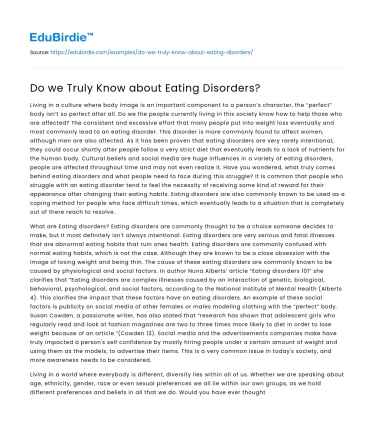Living in a culture where body image is an important component to a person’s character, the “perfect” body isn’t so perfect after all. Do we the people currently living in this society know how to help those who are affected? The consistent and excessive effort that many people put into weight loss eventually and most commonly lead to an eating disorder. This disorder is more commonly found to affect women, although men are also affected. As it has been proven that eating disorders are very rarely intentional, they could occur shortly after people follow a very strict diet that eventually leads to a lack of nutrients for the human body. Cultural beliefs and social media are huge influences in a variety of eating disorders, people are affected throughout time and may not even realize it. Have you wondered, what truly comes behind eating disorders and what people need to face during this struggle? It is common that people who struggle with an eating disorder tend to feel the necessity of receiving some kind of reward for their appearance after changing their eating habits. Eating disorders are also commonly known to be used as a coping method for people who face difficult times, which eventually leads to a situation that is completely out of there reach to resolve.
What are Eating disorders? Eating disorders are commonly thought to be a choice someone decides to make, but it most definitely isn't always intentional. Eating disorders are very serious and fatal illnesses that are abnormal eating habits that ruin ones health. Eating disorders are commonly confused with normal eating habits, which is not the case. Although they are known to be a close obsession with the image of losing weight and being thin. The cause of these eating disorders are commonly known to be caused by physiological and social factors. In author Nuna Alberts’ article “Eating disorders 101” she clarifies that “Eating disorders are complex illnesses caused by an interaction of genetic, biological, behavioral, psychological, and social factors, according to the National Institute of Mental Health (Alberts 4). This clarifies the impact that these factors have on eating disorders. An example of these social factors is publicity on social media of other females or males modeling clothing with the “perfect” body. Susan Cowden, a passionate writer, has also stated that “research has shown that adolescent girls who regularly read and look at fashion magazines are two to three times more likely to diet in order to lose weight because of an article.”(Cowden 13). Social media and the advertisements companies make have truly impacted a person's self confidence by mostly hiring people under a certain amount of weight and using them as the models, to advertise their items. This is a very common issue in today's society, and more awareness needs to be considered.
Save your time!
We can take care of your essay
- Proper editing and formatting
- Free revision, title page, and bibliography
- Flexible prices and money-back guarantee
Living in a world where everybody is different, diversity lies within all of us. Whether we are speaking about age, ethnicity, gender, race or even sexual preferences we all lie within our own groups, as we hold different preferences and beliefs in all that we do. Would you have ever thought that this would have anything to do with eating disorders? Diversity is an argumentative topic to speak upon, but throughout the studies that people have done on this, it is widely said that eating disorders only affect young, white, and straight, middle class women. Therefore “the misconception that eating disorders do not affect people of color, Lesbian, Gay, bisexual or transgender communitites, men, or older people can be detrimental to diagnois and treatment.”(Muhlheim, Farrar, and Vandemark 2.)
As authors Lauren Muhlheim, Tabitha Farrar, and Dagan Vandemark have stated in there article “Diversity and Eating Disorders” that certain people refuse to even visit a doctor because of the low advantage of even being diagnosed is a serious issue. For example, the studies done in 2006 have discovered that people of color are much less likely to be diagnosed with an eating disorder, even after following the same or similar symptoms and behaviors that a white patient would claim to be experiencing. This affects the ability of people with eating disorders to feel comfortable enough to speak about the situation with someone who knows how to professionally help. This same issue tends to occure in gay, lesbian, Bisexual and Lesbian people, although most people diagnosed with eating disorders are woman, it is sure shocking to know that eating disorders are still as common in other genders. “A study published in the International Journal of Eating Disorders examined the prevalence of eating dsorders in bisexual, lesbian and gay communities. Researchers found that out of a small sample of over 500 people, there was a significantly high prevalence of eating disorders among gay men.”(Muhlheim, Farrar, and Vandemark 2).
After having an understanding of this situation involving certain people’s personal preferences, it is important to knowledge that judgment due to a certain diverse group, all types of people are affected physically and emotionally because studies have shown that the sooner an eating disorder is treated, the higher chance of recovery or survival a person has. Overall, a person who is struggling with any of these symptoms must be comfortable and confident enough to know that there are people out there willing to help no matter what your gender is, your age, ethnicity or even sexual preferences are and there needs to be professionals who understand this.






 Stuck on your essay?
Stuck on your essay?

